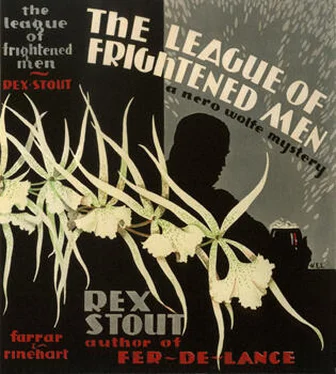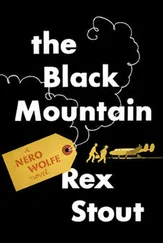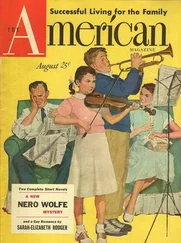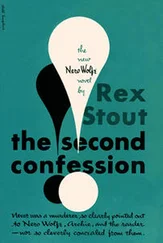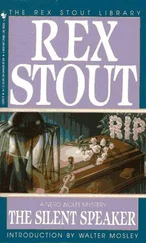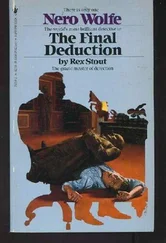At the threshold he paused. “Archie.”
“Yes, sir.”
“Phone Murger’s to send over at once a copy of Devil Take the Hindmost , by Paul Chapin.”
“Maybe they won’t. It’s suppressed pending the court decision.”
“Nonsense. Speak to Murger or Ballard. What good is an obscenity trial except to popularize literature?”
He went on towards the elevator, and I sat down at my desk and reached for the telephone.
After breakfast the next morning, Saturday, I fooled with the plant records a while and then went to the kitchen to annoy Fritz.
Wolfe, of course, wouldn’t be down until eleven o’clock. The roof of the old brownstone house on West Thirty-fifth Street where he had lived for twenty years, and me with him for the last seven of them, was glassed in and partitioned into rooms where varying conditions of temperature and humidity were maintained — by the vigilance of Theodore Horstmann — for the ten thousand orchids that lined the benches and shelves. Wolfe had once remarked to me that the orchids were his concubines; insipid, expensive, parasitic and temperamental. He brought them, in their diverse forms and colors, to the limits of their perfection, and then gave them away; he had never sold one. His patience and ingenuity, supported by Horstmann’s fidelity, had produced remarkable results and gained for the roof a reputation in quite different circles from those whose interest centered in the downstairs office. In all weathers and under any circumstances whatever, his four hours a day on the roof with Horstmann — from nine to eleven in the morning and from four to six in the afternoon — were inviolable.
This Saturday morning I finally had to admit that Fritz’s good humor was too much for me. By eleven o’clock I was back in the office trying to pretend there might be something to do if I looked for it, but I’m not much good at pretending. I was thinking, ladies and gentlemen, my friends and customers, I won’t hold out for a real case with worry and action and profit in it, just give us any old kind of a break. I’ll even tail a chorus-girl for you, or hide in the bathroom for the guy that’s stealing the toothpaste, anything this side of industrial espionage. Anything...
Wolfe came in and said good morning. The mail didn’t take long. He signed a couple of checks I had made out for bills he had gone over the day before, and asked me with a sigh what the bank balance was, and gave me a few short letters. I tapped them off and went out with them to the mailbox. When I got back Wolfe was starting on a second bottle of beer, leaning back in his chair, and I thought I saw a look in his half-closed eyes. At least, I thought, he’s not back on the pretty snowflakes again. I sat at my desk and let the typewriter down.
Wolfe said, “Archie. One would know everything in the world there is to know, if one waited long enough. The one fault in the passivity of Buddha as a technique for the acquisition of knowledge and wisdom is the miserably brief span of human life. He sat through the first stanza of the first canto of the preamble , and then left for an appointment with... let us say, with a certain chemist.”
“Yes, sir. You mean, we just go on sitting here and we learn a lot.”
“Not a lot. But more, a little more each century.”
“You maybe. Not me. If I sit here about two more days I’ll be so damn goofy I won’t know anything.”
Wolfe’s eyes flickered faintly. “I would not care to seem mystic, but might not that, in your case, mean an increase?”
“Sure.” I grunted. “If you had hot once instructed me never again to tell you to go to hell, I would tell you to go to hell.”
“Good.” Wolfe gulped beer and wiped his lips. “You are offended. So, probably, awake. My opening remark was in the nature of a comment on a recent fact. You will remember that last month you were away for ten days on a mission that proved to be highly unremunerative, and that during your absence two young men were here to perform your duties.”
I nodded. I grinned. One of the men had been from the Metropolitan Agency as Wolfe’s bodyguard, and the other had been a stenographer from Miller’s. “Sure. Two could handle it on a sprint.”
“Just so. On one of those days a man came here and asked me to intercept his destiny. He didn’t put it that way, but that was the substance of it. It proved not feasible to accept his commission...”
I had opened a drawer of my desk and taken out a loose-leaf binder, and I flipped through the sheets in it to the page I wanted. “Yes, sir. I’ve got it. I’ve read it twice. It’s a bit spotty, the stenographer from Miller’s wasn’t so hot. He couldn’t spell—”
“The name was Hibbard.”
I nodded, glancing over the typewritten pages. “Andrew Hibbard. Instructor in psychology at Columbia. It was on October twentieth, a Saturday, that’s two weeks ago today.”
“Suppose you read it.”
“Viva voce?”
“Archie.” Wolfe looked at me. “Where did you pick that up, where did you learn to pronounce it, and what do you think it means?”
“Do you want me to read this stuff out loud, sir?”
“It doesn’t mean out loud. Confound you.” Wolfe emptied his glass, leaned back in his chair, got his fingers to meet in front of his belly and laced them. “Proceed.”
“Okay. First there’s a description of Mr. Hibbard. Small gentleman, around fifty, pointed nose, dark eyes —”
“Enough. For that I can plunder my memory.”
“Yes, sir. Mr. Hibbard seems to have started out by saying, How do you do, sir, my name is —”
“Pass the amenities.”
I glanced down the page. “How will this do? Mr. Hibbard said, I was advised to come to you by a friend whose name need not be mentioned, but the motivating force was plain funk. I was driven here by fear.”
Wolfe nodded. I read from the typewritten sheets:
Mr. Wolfe: Yes. Tell me about it.
Mr. Hibbard: My card has told you, I am in the psychology department at Columbia. Since you are an expert, you probably observe on my face and in my bearing the stigmata of fright bordering on panic.
Mr. Wolfe: I observe that you are upset. I have no means of knowing whether it is chronic or acute.
Mr. Hibbard: It is chronic. At least it is becoming so. That is why I have resorted to... to you. I am under an intolerable strain. My life is in danger... no, not that, worse than that, my life has been forfeited. I admit it.
Mr. Wolfe: Of course. Mine too, sir. All of us.
Mr. Hibbard: Rubbish. Excuse me. I am not discussing original sin. Mr. Wolfe, I am going to be killed. A man is going to kill me.
Mr. Wolfe: Indeed. When? How?
Wolfe put in, “Archie. You may delete the Misters.”
“Okay. This Miller boy was brought up right, he didn’t miss one. Somebody told him, always regard your employer with respect forty-four hours a week, more or less, as the case may be. Well. Next we have:
Hibbard: That I can’t tell you, since I don’t know. There are things about this I do know, also, which I must keep to myself. I can tell you... well... many years ago I inflicted an injury, a lasting injury, on a man. I was not alone, there were others in it, but chance made me chiefly responsible. At least I have so regarded it. It was a boyish prank... with a tragic outcome. I have never forgiven myself. Neither have the others who were concerned in it, at least most of them haven’t. Not that I have ever been morbid about it — it was twenty-five years ago — I am a psychologist and therefore too involved in the morbidities of others to have room for any of my own. Well, we injured that boy. We ruined him. In effect. Certainly we felt the responsibility, and all through these twenty-five years some of us have had the idea of making up for it. We have acted on the idea — sometimes. You know how it is; we are busy men, most of us. But we have never denied the burden, and now and then some of us have tried to carry it. That was difficult, for pawn — that is, as the boy advanced into manhood he became increasingly peculiar. I learned that in the lower schools he had given evidence of talent, and certainly in college — that is to say, of my own knowledge, after the injury, he possessed brilliance. Later the brilliance perhaps remained, but became distorted. At a certain point —
Читать дальше
